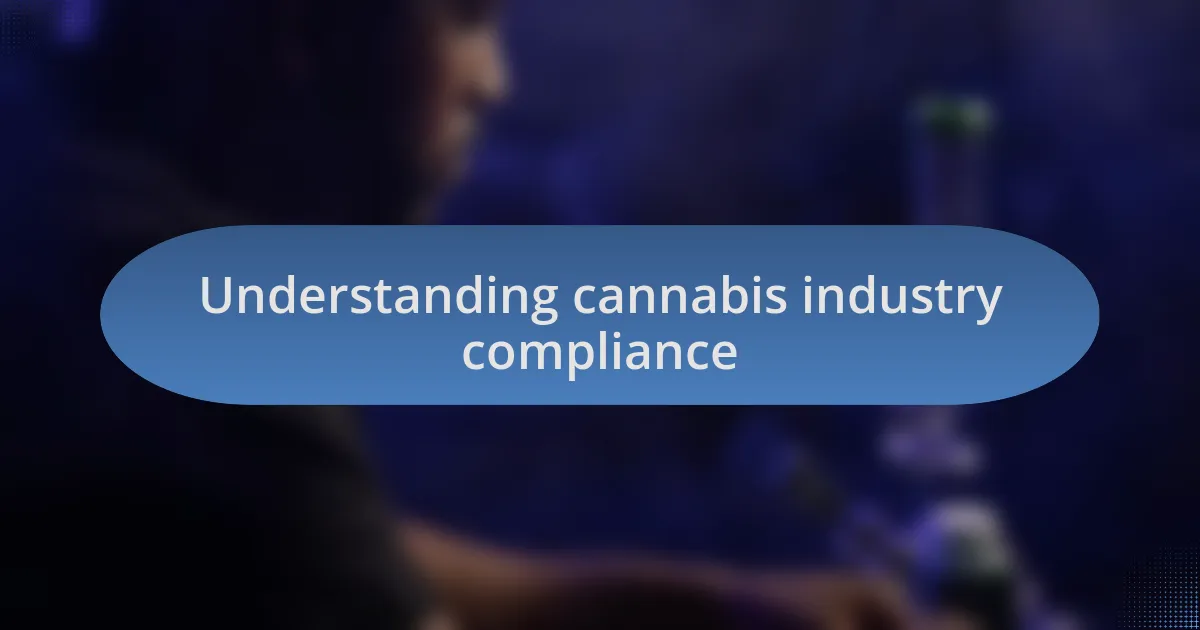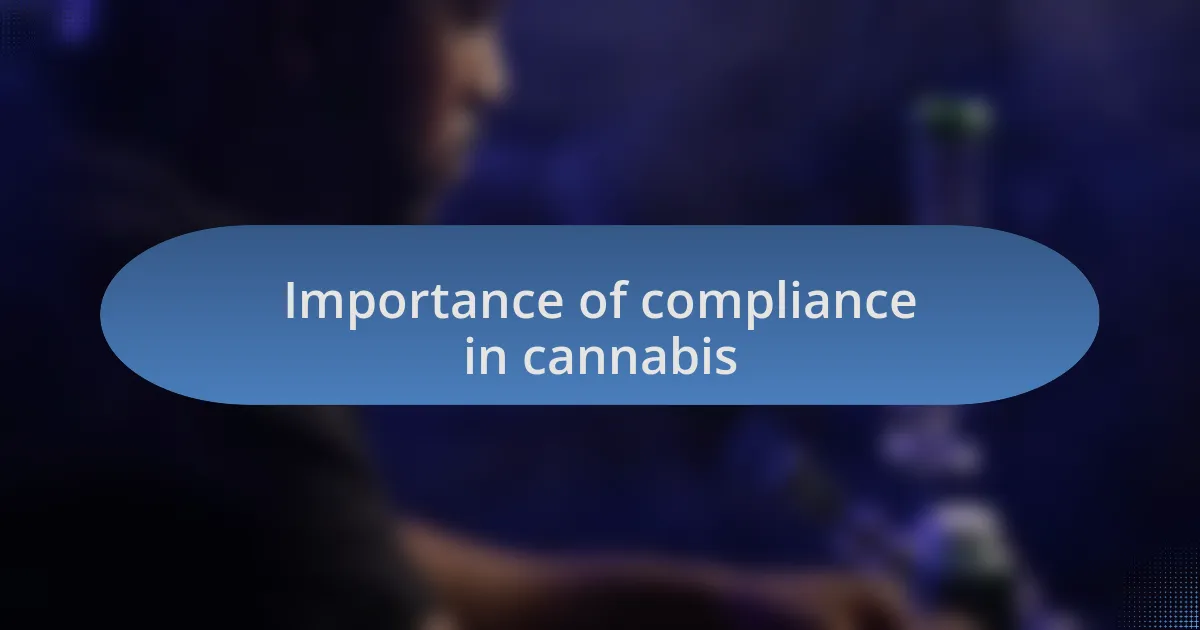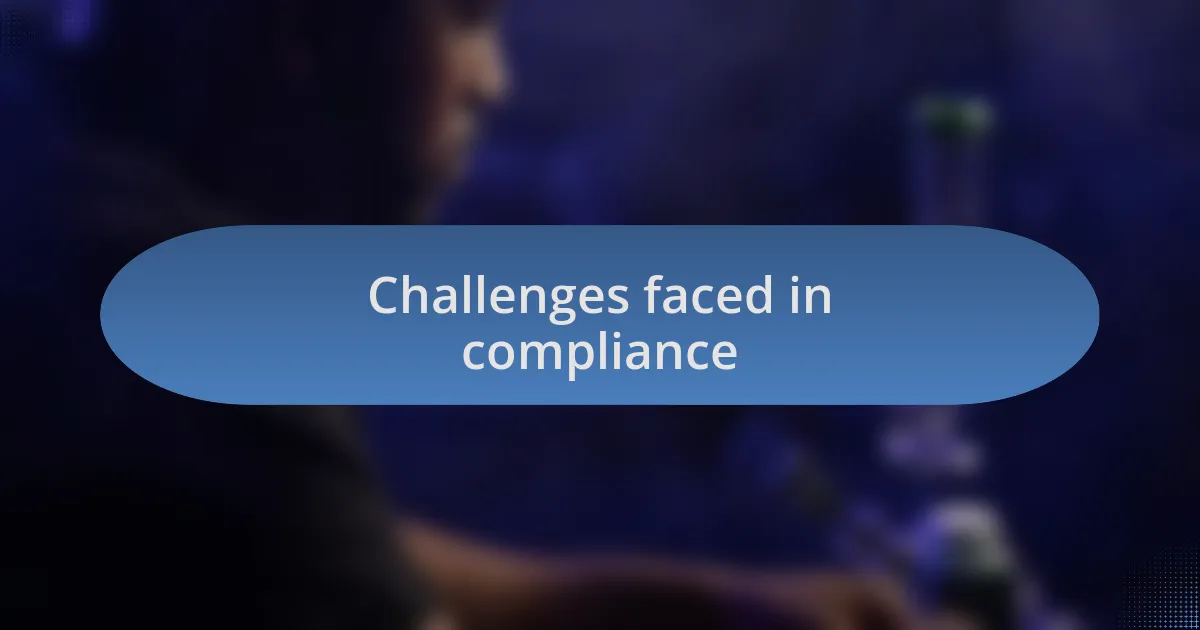Key takeaways:
- Compliance is integral to the cannabis industry, fostering trust with customers and regulators, and impacting business success.
- Engaging in educational events, such as cannabis expos, enhances awareness of compliance challenges and strategies among professionals.
- Challenges include rapidly changing regulations, extensive documentation, and discrepancies between state and federal laws, necessitating resilient practices.
- Proactive compliance measures, investment in technology, and a culture of accountability can significantly improve adherence to regulations.

Understanding cannabis industry compliance
Navigating cannabis industry compliance can feel like wandering through a maze, especially with the constantly changing regulations. I remember my first experience in this sector; I was overwhelmed, trying to track local laws that seemed to change overnight. Have you ever felt that way? It’s crucial to stay informed, as compliance isn’t just a matter of following rules — it’s about building trust with customers and regulators alike.
Compliance encompasses a variety of components, from product testing to packaging and advertising restrictions. I once attended a workshop where a compliance officer shared a story about a small business that faced hefty fines for mislabeled products. It struck me how easily a misstep can cost not just money, but credibility. How can you ensure you’re always adhering to these evolving standards?
In my observations, successful cannabis businesses often view compliance as an integral part of their mission rather than a hurdle to overcome. It’s heartening to see companies invest time and resources in training staff and developing transparent practices. Wouldn’t it be rewarding to operate in an environment where compliance fosters innovation and growth rather than stifling creativity? Embracing this mindset can enhance your brand reputation and help you thrive in a competitive market.

Importance of compliance in cannabis
Compliance in the cannabis industry isn’t just a bureaucratic necessity; it’s the backbone of a trustworthy operation. I vividly recall a time when a friend’s dispensary faced a sudden inspection. They passed with flying colors, not because of luck, but due to their strict adherence to regulations. That experience highlighted to me that a robust compliance plan can mean the difference between success and stalled growth.
The stakes are incredibly high – failing to comply can lead to fines, product recalls, or worse, loss of licensing. In moments like these, I often ponder the long-term implications of short-sighted decisions. A business that cuts corners may save money today but risks everything when the regulatory hammer falls. Has anything ever made you reconsider your approach because of potential consequences?
Moreover, compliance fosters a culture of accountability and integrity, which resonates deeply with consumers. When companies prioritize adherence to laws, they signal to customers that they care about safety and quality. During a product launch I witnessed, the brand emphasized their compliance efforts in marketing materials. The positive customer response was palpable. Isn’t it invigorating to think that compliance can actually enhance your customer relationships rather than alienate them?

Overview of cannabis expo events
Attending cannabis expo events has always been a fascinating experience for me, as they serve as vibrant platforms where industry trends, innovations, and compliance issues intertwine seamlessly. I remember walking into my first expo and feeling the palpable energy; it was invigorating to connect with fellow enthusiasts and professionals, all eager to share insights and experiences. Each booth was a treasure trove of information, making it a prime opportunity for networking and growth.
These events not only showcase new products but also host educational seminars focusing on regulatory challenges and compliance strategies. For example, I found a workshop on navigating local compliance laws particularly enlightening. Listening to industry experts discuss their successes and hurdles made me realize how vital these discussions are for anyone wanting to thrive in this ever-evolving landscape. Have you ever left an event feeling more informed and inspired than when you arrived? That’s the power of participating in these expos.
Moreover, cannabis expos emphasize the communal aspect of this industry, highlighting a shared commitment to responsible practices. As I mingled with attendees, I couldn’t help but feel a sense of belonging—a collective desire to push for higher standards and ethical business practices. It’s refreshing to see competitors come together, recognizing that compliance is crucial not only for their success but for the integrity of the entire industry. How often do you find yourself in environments where everyone is working towards a common goal? At cannabis expos, this sense of unity is both motivating and reassuring.

Key compliance topics at expos
When attending a cannabis expo, one of the key compliance topics that often surfaces is labeling and packaging regulations. I recall a workshop where an expert shared their story about navigating the complex maze of requirements in different states. It was eye-opening to see how something as simple as a product label could lead to significant legal implications. This highlights the importance of staying updated on evolving regulations to avoid costly setbacks.
Another crucial area of compliance revolves around health and safety standards, especially in relation to product testing. I once had a spirited discussion with a grower who had an unsettling experience when a batch of products failed quality tests. This incident underscored the necessity of rigorous testing protocols to ensure consumer safety and maintain trust. Have there been instances where compliance challenges made you rethink your processes? It’s these moments that can lead to improved practices and heightened awareness.
Furthermore, navigating advertising and marketing regulations is a hot topic at expos. I remember watching a panel debate the fine line between creative marketing and compliance. The tension in the room was palpable as participants shared their experiences with regulatory bodies. It made me wonder how many brands are aware of the pitfalls that can come with misleading advertisements. Engaging in these discussions helps clarify expectations and enhances the overall industry standards.

My experience with compliance discussions
Engaging in compliance discussions has always been a mixed bag of challenges and learning opportunities for me. I remember a roundtable session where a compliance officer laid bare the intricacies of state regulations—his passion was infectious. I found myself reflecting on my own experiences and wondering how often we overlook the nuances in the industry, convinced that a one-size-fits-all approach could suffice. The stark reality is that it seldom does.
During another expo, I had a candid conversation with a fellow entrepreneur who shared the nerve-wracking moment when their license was almost revoked due to minor paperwork errors. Hearing about her fear of losing everything she worked for struck a chord with me. It made me realize that compliance isn’t just a checklist; it’s a continuous commitment that can shape the future of our businesses and our industry as a whole.
I often find myself pondering how compliance discussions can evolve in the face of rapid industry changes. For instance, I participated in a brainstorming session where we debated the upcoming shifts in cannabis edibles regulations. It was exhilarating and daunting at the same time. Are we truly prepared for the changes that could reshape our practices? This question is worth considering, as our ability to adapt will define our success in an ever-evolving landscape.

Challenges faced in compliance
Navigating the labyrinth of compliance can often feel like trying to find your way through a dense fog. I’ve encountered instances where regulations changed overnight, leaving businesses scrambling to meet new requirements. It reminds me of a crucial moment when our team had to overhaul our labeling process in just a week—what a whirlwind that was! I wonder, how can we build more resilience in our operations to tackle such sudden shifts?
Another challenge that stands out is the sheer volume of documentation required. There was one project I worked on where we had to sift through mountains of paperwork to ensure everything was in order for an audit. It was overwhelming and anxiety-inducing, especially as deadlines loomed closer. It begs the question: how can we streamline our compliance processes to alleviate this pressure without compromising quality?
Finally, the disparities between state and federal regulations continue to be a significant hurdle. I remember discussing this with a compliance expert who emphasized the confusion this creates for operators. Trying to align with conflicting laws often feels like walking a tightrope—one misstep could have devastating consequences. How do we advocate for more clarity in this fragmented landscape? It’s a tough road, but fostering open dialogue and collaboration can lead to better understanding and better practices across the board.

Insights for improving compliance practices
Improving compliance practices requires a proactive mindset. I recall a time when my team implemented a bi-weekly compliance review, which significantly reduced errors. It was amazing to see how just a small change in schedule could lead to better adherence to regulations. What if regularly checking in on compliance could become standard practice across the industry?
Investing in technology can also transform compliance efforts. In my experience, utilizing software that tracks changes in regulations has saved us countless hours. It not only provides alerts on critical updates but also centralizes our documentation, making audits less daunting. How much more efficient could we be if every business embraced such tools?
Lastly, fostering a culture of compliance within the organization is essential. I’ve had instances where informal training sessions led to a more informed team, ready to face compliance challenges confidently. When everyone understands their role in compliance, the entire process becomes smoother. Isn’t it time we prioritize education and awareness in our compliance approaches?